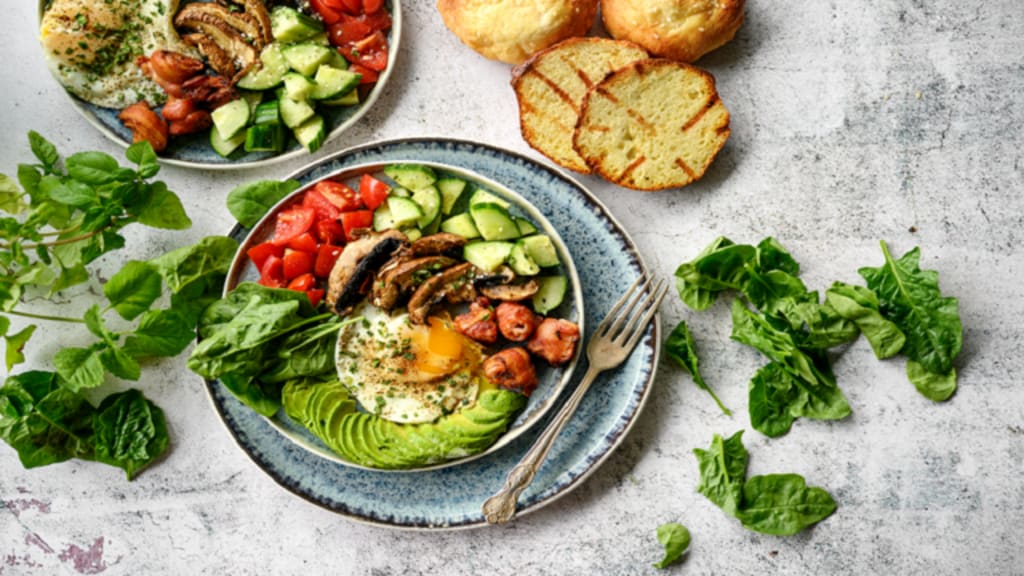A study warns: A modern low-carb diet may double the risk of heart disease!
A study finds that following the keto diet may increase the risk of fatal cardiovascular disease.

The low-carb diet has become incredibly popular in recent years as a powerful weight-loss tool, with an estimated 13 million Americans following it.
But Canadian researchers who tracked 1,500 people for more than a decade found that the diet may raise levels of "bad" cholesterol.
They found that those who followed a high-fat, low-carb diet were more likely to suffer from cardiovascular diseases such as clogged arteries, heart attacks and strokes, compared to their peers.
The team believes that this is because high levels of harmful cholesterol cause fatty deposits to build up in the walls of the arteries, which can narrow or block them.
“Among participants on a low-calorie, high-fat diet [similar to the keto diet], we found that those with the highest levels of lipoprotein cholesterol had the lowest levels of lipoprotein cholesterol,” said Dr. High-density lipoprotein (LDL) are at greatest risk of cardiovascular disease.Our findings suggest that people considering following a similar diet should be aware that doing so may lead to increased levels of LDL cholesterol.Before starting this dietary pattern, "They should consult their health care provider. While on the diet, it is recommended that they monitor their cholesterol levels and should try to address other risk factors for heart disease or stroke, such as diabetes, high blood pressure, physical inactivity and smoking."
However, a major limitation of the 12-year study is that the participants were only asked about their diets once. There was no way to check if they had adhered to the same diet all those years.
Our bodies naturally produce "bad" cholesterol, or low-density lipoprotein (LDL), but eating diets high in saturated and trans fats causes the body to produce more LDL.
LDL contributes to the buildup of inflammatory fatty deposits known as plaques in your arteries, which increases your risk of heart attack or stroke. It is one of two types of cholesterol in the body. The other - high-density lipoprotein (HDL) - absorbs cholesterol in the arteries and carries it back to the liver, then flushes it out of the body. That's why it's called the "good" cholesterol.
The keto diet involves getting between 60 to 80 percent of your daily calories from fats, including cheese, avocados, and fatty fish, and 20 to 30 percent from proteins.
Followers try to consume as few carbohydrates as possible, which means cutting back on bread, rice and potatoes, among other sources. Carbohydrates are the main source of energy that the body uses when exercising or moving on a daily basis.
But the lack of carbohydrates in the body pushes people into a state called “ketosis” where it starts breaking down fats for energy. The idea is to tap into stubborn fat stores, speed up weight loss and help with mental clarity — although there are mixed results on how effective this is.
In the study, which was led by scientists at the University of British Columbia in Vancouver, researchers scanned a UK biobank for participants who followed a keto diet.
After looking at 70,684 people who had data on their daily calories and cholesterol levels taken at once, they found 305 participants who followed a keto-like diet.
This was defined as getting more than 45% of your daily calories from fat and less than a quarter from carbohydrates.
They were matched with 1,220 individuals whose diets did not meet this definition.
Overall, about three-quarters of the participants were female, with an average age of 54. They were all considered to be overweight.
Data were analyzed with controls for factors including diabetes, high blood pressure, smoking and obesity.
During the 12-year study, about 9.8% of people in the ketogenic diet group experienced a serious cardiac event.
This included heart attacks, strokes, and artery blockages that required a stent procedure - an operation in which a coil of wire mesh is inserted into an artery to prop it up and keep it open.
For comparison, in the group eating the standard diet, only 4.3% experienced serious heart events over the same period.
The researchers also found higher levels of low-density lipoprotein cholesterol -- or bad cholesterol -- and apolipoprotein B, a protein that helps carry fat and cholesterol through the body, in the keto group.
The study's limitations include that participants were only tested on their diets once, meaning they may not have stuck to them throughout the 12-year study period.
The study was presented at the American College of Cardiology's Annual Scientific Session as well as the World Congress of Cargiology in New Orleans, Louisiana. Source: Daily Mail
6 simple changes that will instantly boost your health!
MailOnline spoke to diet, exercise and mental health experts, to gather the best tips you can implement right away to feel your healthiest.
Including more plant-based ingredients in your diet is advice from one of the leading nutrition experts, Professor Tim Spector.
Nuts, seeds, beans, legumes, whole grains, herbs, spices and even coffee should be included -- in addition to fruits and vegetables.
The co-founder of ZOE, which has tracked Covid infections during the pandemic but is now focusing on personalized nutrition, told MailOnline: "If you're going to do one thing for your gut health this week, make it eat 30 different plants."
The recommendation comes from an American Gut Project study he co-authored, which examined stool samples and the self-reported eating habits of thousands of people in the US, UK and Australia.
The results, published in the journal mSystems, showed that those who ate at least 30 different plants each week had a healthier microbiome than those who ate only 10 plants per week.
Prof Spector explained: "Having a diverse microbiome is associated with significant health outcomes including better blood glucose control and reduced visceral fat."
Therefore, he advocates the following: "To feel healthier, try adding more plants to your day."
Enjoy your food
Healthy eating conjures up images of bland salads and soups.
But enjoying what you eat is key to staying healthy, according to ZOE chief scientist Dr Sarah Perry.
She told MailOnline: 'For many of us, food is something much more than just a way to get energy, it's part of our culture and family life, it's a huge part of our social connection, and is often deeply connected to our emotions. Food is there to bring us together and help us connect with each other.' each other.It also exists to bring pleasure, and eating something really tasty can bring a lot of joy.So, it's not just something to do with physical health, it's also about mental health like your favorite melt-in-your-mouth chocolate bar or getting together with family and friends to celebrate "Birthday cake. To me, if a food is too healthy to be enjoyed, it's not healthy at all."
Eat only when you feel hungry
Avoiding eating when you're not hungry and not always cleaning your plate can promote health, Emily Lemming, ZOE's chief nutrition scientist told MailOnline.
"Learning to listen to our body's hunger signals is one of the best ways to help our metabolism," she said.
Many eat a meal, she said, "because we have a routine of eating at a certain time."
"While this may work for some of us, it's a good idea to practice asking ourselves if we're really hungry before we eat," Lemming added.
This practice - known as intuitive eating and developed by US scientists in the 1990s - involves relying on feelings of hunger and fullness to decide when and how much to eat.
Studies have linked this approach to lower body weight, positive body image, lower rates of eating disorders, and higher levels of well-being.
It is based on 10 principles, which include no forbidden foods, controlling hunger levels and dealing with emotions without the use of food.
"By learning to listen to and follow our body's hunger cues, we can find our ideal pattern of eating that works for us as an individual each day," Lemming added.
Take a break from social media
It is well known that spending too much time in front of screens is not good for mental or physical health.
Just deleting certain apps from your phone or having your phone out of reach for parts of the day can help, says Dr Geoff Lambert, associate professor of health and psychology at the University of Bath.
Studies reveal the impact of social media on health.
Researchers at the Great Ormond Street Institute of Child Health, part of University College London, questioned nearly 12,000 young people aged between 13 and 16 about their social media and mental health.
The findings, published in The Lancet Child & Adolescent Health, show that those who checked sites such as Facebook, Twitter and Instagram more than three times a day were more anxious. They also sleep and get a little exercise.
A study conducted by Dr. Lambert and his team found that taking a break from social media for just one week can improve mental health.
The results, published in the journal Cyberpsychology Behavior and Social Networking, showed that those who stopped using the apps for a week reported improvements in well-being, depression and anxiety, compared to those who continued to use social media.
Some ways to do this might be deleting social media apps from your phone or installing self-monitoring apps to track your social media usage.
You can also plan specific social media windows during the week or move your phone out of reach when you engage in other activities to eliminate temptation.
Walk for an additional 10 minutes
Many may avoid exercise because they cannot bear to sweat in the gym.
But even just a 10-minute walk — which doesn't require a gym membership — is enough to feel the benefits of exercise and boost mental health, says Dr. Lambert.
Studies have shown that people who exercise regularly are less likely to develop heart disease, stroke, type 2 diabetes, some types of cancer, depression, and dementia.
Walking can also be easier for many people, as it does not require a large commitment or the purchase of sports equipment. Also, brisk walking -- about 3 miles (4.8 kilometers) per hour -- builds endurance, burns calories and makes for a healthier heart, according to the health services.
And if a 30-minute walk seems too long, try 10 or 15 minutes.
You can also install a pedometer on your phone to track the number of steps you take each day.
Only make sustainable changes
Those who have turned to crash diets or intense workouts in the past have likely faced the fact that there is no quick fix to achieving long-term health.
So the best advice for staying healthy for years to come is to make changes you can stick with, says Professor Colin Greaves, who specializes in lifestyle behavior change at the University of Birmingham.
He told MailOnline: "My only advice on how to change your lifestyle rather than what to do specifically - there is no one magic bullet. It boils down to this: make changes you can live with. Look at all the ideas of small changes you can make to eat Eat healthy or be more active.
Professor Graves suggests choosing six things that can be easily incorporated into daily routines, are enjoyable or useful in some way - such as saving money.
He explained, "Making big changes that go against the nature of your life are difficult to stick to in the long run, and you will easily fall back 'back to your old habits'."
10 minutes of strength training twice a week
Making time for strength training twice a week will build and improve strength to keep muscles, bones and joints strong and healthy, says Dr Ashley Gluchowski, Clinical Exercise Physiologist at The University of Manchester.
Strengthening muscles has also been linked to a lower risk of type 2 diabetes, cardiovascular disease and some types of cancer. Meanwhile, a lack of strength means that daily exercise becomes more difficult as the body ages. Source: Daily Mail
About the Creator
News Correct
Information WorldWide MORE INFORMATION
Enjoyed the story? Support the Creator.
Subscribe for free to receive all their stories in your feed. You could also pledge your support or give them a one-off tip, letting them know you appreciate their work.






Comments
There are no comments for this story
Be the first to respond and start the conversation.